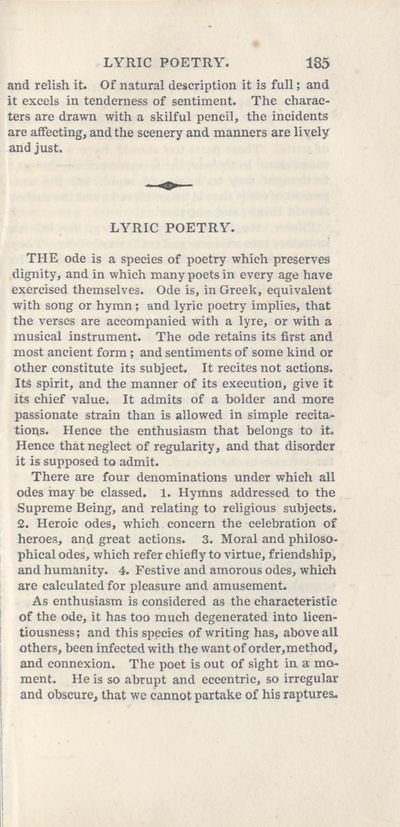Education > Essays on rhetoric
(213)
Download files
Complete book:
Individual page:
Thumbnail gallery: Grid view | List view

LYRIC POETRY.
185
and relish it. Of natural description it is full; and
it excels in tenderness of sentiment. The charac¬
ters are drawn with a skilful pencil, the incidents
are affecting, and the scenery and manners are lively
and just.
LYRIC POETRY.
THE ode is a species of poetry which preserves
dignity, and in which many poets in every age have
exercised themselves. Ode is, in Greek, equivalent
with song or hymn; and lyric poetry implies, that
the verses are accompanied with a lyre, or with a
musical instrument. The ode retains its first and
most ancient form; and sentiments of some kind or
other constitute its subject. It recites not actions.
Its spirit, and the manner of its execution, give it
its chief value. It admits of a bolder and more
passionate strain than is allowed in simple recita¬
tions. Hence the enthusiasm that belongs to it.
Hence that neglect of regularity, and that disorder
it is supposed to admit.
There are four denominations under which all
odes may be classed. 1. Hymns addressed to the
Supreme Being, and relating to religious subjects.
2. Heroic odes, which concern the celebration of
heroes, and great actions. 3. Moral and philoso¬
phical odes, which refer chiefly to virtue, friendship,
and humanity. 4. Festive and amorous odes, which
are calculated for pleasure and amusement.
As enthusiasm is considered as the characteristic
of the ode, it has too much degenerated into licen¬
tiousness; and this species of writing has, above all
others, been infected with the want of order,method,
and connexion. The poet is out of sight in a mo¬
ment. He is so abrupt and eccentric, so irregular
and obscure, that we cannot partake of his raptures.
185
and relish it. Of natural description it is full; and
it excels in tenderness of sentiment. The charac¬
ters are drawn with a skilful pencil, the incidents
are affecting, and the scenery and manners are lively
and just.
LYRIC POETRY.
THE ode is a species of poetry which preserves
dignity, and in which many poets in every age have
exercised themselves. Ode is, in Greek, equivalent
with song or hymn; and lyric poetry implies, that
the verses are accompanied with a lyre, or with a
musical instrument. The ode retains its first and
most ancient form; and sentiments of some kind or
other constitute its subject. It recites not actions.
Its spirit, and the manner of its execution, give it
its chief value. It admits of a bolder and more
passionate strain than is allowed in simple recita¬
tions. Hence the enthusiasm that belongs to it.
Hence that neglect of regularity, and that disorder
it is supposed to admit.
There are four denominations under which all
odes may be classed. 1. Hymns addressed to the
Supreme Being, and relating to religious subjects.
2. Heroic odes, which concern the celebration of
heroes, and great actions. 3. Moral and philoso¬
phical odes, which refer chiefly to virtue, friendship,
and humanity. 4. Festive and amorous odes, which
are calculated for pleasure and amusement.
As enthusiasm is considered as the characteristic
of the ode, it has too much degenerated into licen¬
tiousness; and this species of writing has, above all
others, been infected with the want of order,method,
and connexion. The poet is out of sight in a mo¬
ment. He is so abrupt and eccentric, so irregular
and obscure, that we cannot partake of his raptures.
Set display mode to:
![]() Universal Viewer |
Universal Viewer | ![]() Mirador |
Large image | Transcription
Mirador |
Large image | Transcription
| Antiquarian books of Scotland > Education > Essays on rhetoric > (213) |
|---|
| Permanent URL | https://digital.nls.uk/113762048 |
|---|
| Description | Thousands of printed books from the Antiquarian Books of Scotland collection which dates from 1641 to the 1980s. The collection consists of 14,800 books which were published in Scotland or have a Scottish connection, e.g. through the author, printer or owner. Subjects covered include sport, education, diseases, adventure, occupations, Jacobites, politics and religion. Among the 29 languages represented are English, Gaelic, Italian, French, Russian and Swedish. |
|---|

